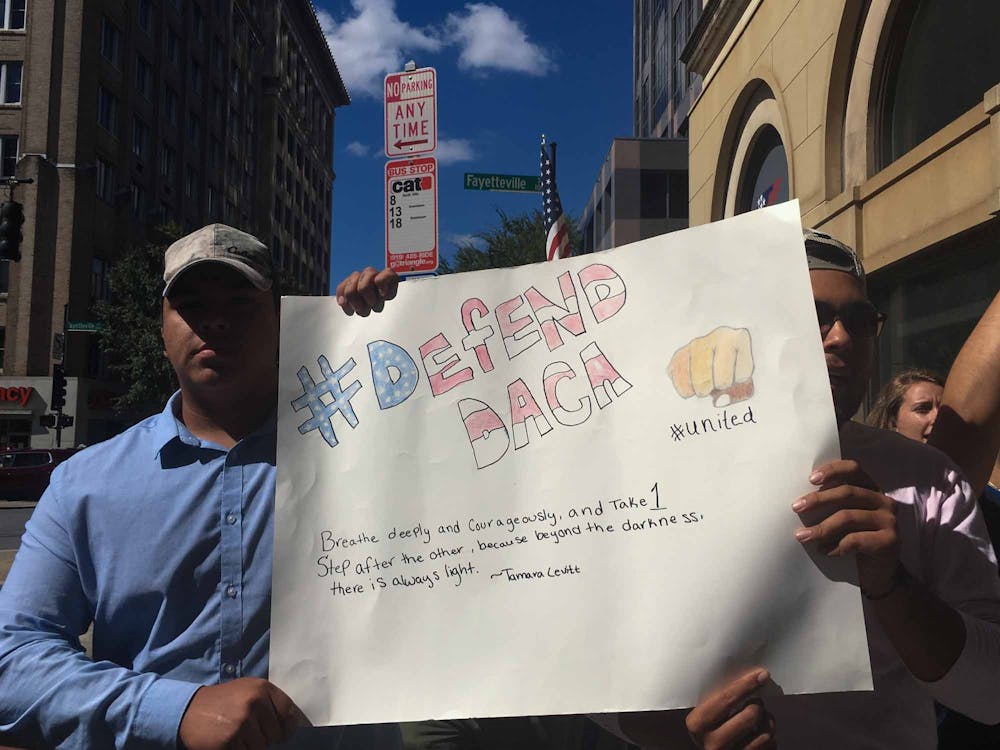“Sanctuary campus movement: I think that they mark an aspirational position on the spectrum of responses, certainly in North Carolina,” he said.
Li-Chen Chin, Duke University’s assistant vice president for intercultural programs, said in an email that the sanctuary campus designation has no legal basis and cannot confer any additional protections that are not already in place.
Duke meets 100 percent of demonstrated need for all undocumented students and assists with DACA renewal applications and legal referrals.
Citlaly Mora, the communications associate at the ACLU of North Carolina, said many university sanctuary policies remain discreet in order to protect students.
“Whether it’s sanctuary campuses or sanctuary policies, I think a lot of it more than legal basis is just that symbolic demonstration of solidarity and commitment to protect undocumented members of their community,” she said.
'This is where I am'
Beyond administrative policies, students and faculty are working to make undocumented students feel at home.
Axel Herrera Ramos, a senior at Duke and a DACA recipient, co-founded the university’s chapter of Define American. He said the organization provides a space for students to feel supported without needing to out themselves as undocumented.
“It’s not a burden on that one individual to continuously be having to educate others on why their status is what it is, why the immigration system is what it is, and carry that whole weight of that history, which is so messy," he said. "It’s so dark, it’s so cruel in some instances, and it’s so personal for so many people."
José Villalba, Wake Forest University’s vice president for diversity and inclusion and chief diversity officer, said in an email that the university has been working with the Presidents’ Alliance on Higher Education and Immigration to prepare for the impact of the possible rescindment of DACA.
He said Wake complies with information requests required by law and is not a sanctuary campus. A 2016 university FAQ stated that the university refuses to voluntarily share information with ICE and Customs Border Protection and provides undocumented students with scholarships, support and counseling services and connection to legal resources.
Mir Yarfitz, the faculty advisor for Wake’s Student Movement for Immigration Justice, said one of the dangers of DACA is that it creates a list of undocumented students that ICE might refer to in the event DACA is rescinded.
To get the day's news and headlines in your inbox each morning, sign up for our email newsletters.
“Anything designed for advocacy can also become a site of potential target,” he said.
At the same time, Ambar Pinto, who works on resource mobilization at United We Dream, said all undocumented immigrants share fundamental rights such as the right to remain silent, the right to not open the door and the right to ask for an attorney when interacting with an ICE or CBP agent.
“The key thing that DACA does for undocumented immigrants is that it provides protection of deportation,” she said.
If DACA is rescinded, recipients will no longer have this protection.
Ramón Ochoa said the resource team is sensitive to the fact that UNC’s DACA recipients and undocumented students are North Carolinians.
“So we don’t want to make the default resource for these North Carolinians the Office of International Students and Scholars,” he said. “The default resource for our undocumented Tar Heels should be the default resource of any North Carolina student.”
Herrera Ramos said ultimately he considers the United States his home.
“This is where I am and despite all the uncertainty and all the fear, there is nothing that can happen in regards to this enforcement that is going to make me have a change of heart or change of mind," he said.
@slesnewski
city@dailytarheel.com




